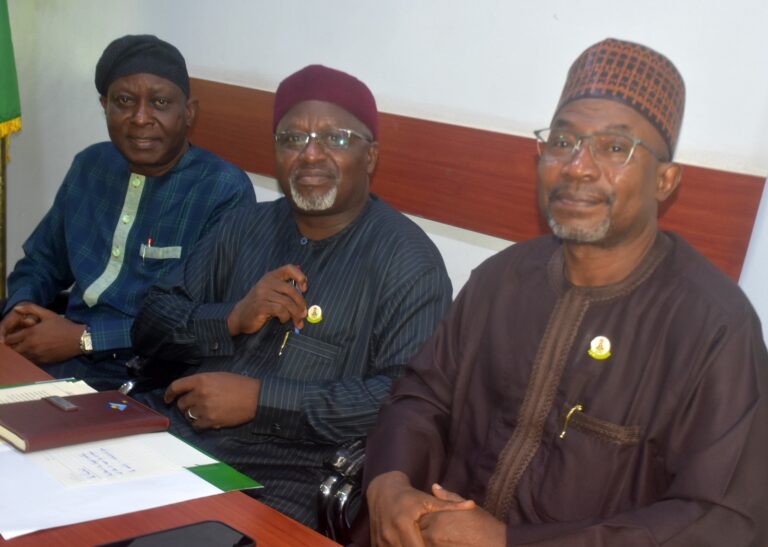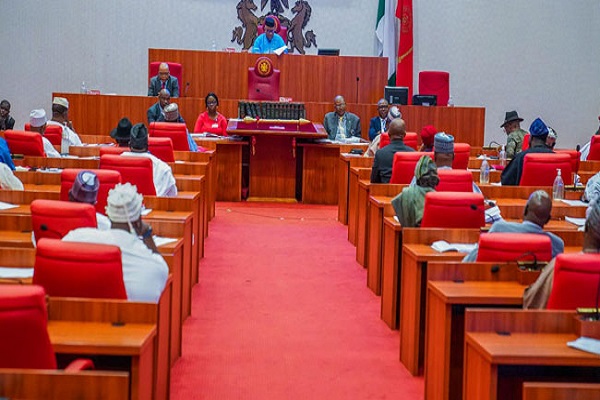News
Reforms: COREN creates new inspectorates in 6 geo-political zones

(Photo: President of COREN, Prof. Sadiq Abubakar, Vice President of COREN (left) Mr Ola Olu Ogunduyile and Prof. Adisa Bello, Registrar of COREN.)
The Council for Regulation of Engineering in Nigeria (COREN) on Wednesday, says it is expanding its departments into inspectorates across the six geopolitical zones to foster effective and efficient operations.
The President of COREN Prof. Sadiq Abubakar, stated this at a news conference to announce the upcoming 31st Engineering Assembly slated for Aug.7 to 9 in Abuja.
He said the theme of the event is: ‘Entrenching and Strengthening Engineering Practitioners Code of Conduct for Resilient Engineering Practice in Nigeria’.
He said that the event would bring all cadres of engineering practitioners together, to brainstorm on issues that would lift the profession to greater heights.
The president said that participation was compulsory for all members of the council.
Abubakar said that directorates would create a robust and responsive structure, that would allow the council express itself as a regulator in line with best global practice.
“COREN under the present leadership is being restructured for more effective and efficient operations and service delivery through promoting professionalism, fostering new and strengthening existing partnerships.
“This would lead to positive reforms in the education, training and practice of the engineering profession in our dear Nation.
“The roadmap would ensure that the existing technical departments are strengthened and expanded from five to eight.
“The new operational structure of COREN departments translated into Inspectorates will be cascaded from headquarters to six geopolitical zones and ultimately to all states.
“This would be re-enforced with the establishment of partnerships with key stakeholders, using varied modes of engagement to ensure effective coverage of the entire country.”
Abubakar said that the scope of activities of the council would also be expanded to 10 sectors, including power, oil and gas, aviation, mining, maritime and telecommunications.
Other sectors are Transport, Agro-Allied, Manufacturing and Production in addition to the Construction industry.
He said that the scope of the activities of COREN comprised three major components of the mandate of the council, which are the control and regulation of engineering education.
Others are control and regulation of engineering training, control and regulation of engineering practice.
According to him, before now the council had not been assertive on its control and regulation of its mandate like the health sector education.
“If a university would exceed the quota that the medical council or the dental or pharmaceutical council will give it, would be sanctioned.
“If the number of enrollment exceed your facilities that is for practical and teaching they will descend on you.
“We have activated that, it is already in our law, we have what we call the BMAS that defines the maximum number a university can admit students in any of the engineering profession.
“Based on the facilities of teaching, workshops and laboratories, just like medical students we have already written to universities and polytechnics and we are supposed to follow up with enforcement.
“We want to make sure that the skill and the proficiency of graduates whether in university or in polytechnic is sacrosanct.
“We have written to all universities all polytechnics that there must be oath taking of engineering graduates.
“And if you don’t comply we are going to sanction you and our inspectorates at the state level, will begin to invite you when the university or polytechnic is graduating its engineers,” Abubakar said.
NAN reports that the Assembly is an annual event, which features presentations and discussions relevant to the theme of the year by eminent Practitioners, scholars and technocrats.
It is designed to foster continuous professional development of engineering Practitioners among other benefits.
Headline
Prince Harry visits sick Nigerian soldiers in Kaduna

Prince Harry and his team visited the 44 Nigerian Army Reference Hospital in Kaduna to interact with wounded soldiers who are receiving treatment.
The Duke of Sussex is in Nigeria with his wife to champion the Invictus Games, which Harry founded to aid the rehabilitation of wounded and sick servicemembers and veterans.
Nigeria joined the Invictus Community of Nations in 2022 becoming the first African country to join.
Prince Harry’s visit to Kaduna came 68 years after his late grandmother Queen Elizabeth II visited the state during the time of the late Premier of Northern Region Sir Ahmadu Bello.




News
Senate approves death penalty for drug traffickers

Senate on Thursday, May 9, approved the death penalty for those convicted on the charge of drug trafficking in the country.
The punishment prescribed in the extant NDLEA Act is a maximum sentence of life imprisonment.
The resolution of the Senate followed its consideration of a report of the Committees on Judiciary, Human Rights and Legal Matters and Drugs and Narcotics, National Drug Law Enforcement Agency (NDLEA) Act (Amendment) Bill, 2024.
The Chairman of the Committee on Judiciary, Human Rights & Legal Matters presented the report during plenary, Senator Mohammed Monguno (APC-Borno North).
The bill, which passed its third reading, aims to update the list of dangerous drugs, strengthen the operations of the NDLEA, review penalties, and empower the establishment of laboratories.
Section 11 of the current act prescribes that “any person who, without lawful authority; imports, manufactures, produces, processes, plants or grows the drugs popularly known as cocaine, LSD, heroin or any other similar drugs shall be guilty of an offence and liable on conviction to be sentenced to imprisonment for life” was amended to reflect a stiffer penalty of death.
Although the report did not recommend a death penalty for the offence, during consideration, Senator Ali Ndume moved that the life sentence should be upgraded to the death penalty.
During a clause-by-clause consideration of the Bill, Deputy Senate President Barau Jibrin, who presided over the session, put the amendment on the death penalty to a voice vote and ruled that the “ayes” had it.
But Senator Adams Oshiomhole objected to the ruling, saying that the “nays” had it.
He argued that matters of life and death should not be treated hurriedly, but Barau said it was too late, as he failed to call for division immediately after his ruling.
The bill was subsequently read for the third time and passed by the Senate.
-

 Headline5 days ago
Headline5 days agoSuspend cybersecurity levy– Reps to CBN
-

 Business5 days ago
Business5 days agoNigeria needs over $2bn to revive Ajaokuta Steel Plant, says Minister
-

 Entertainment3 days ago
Entertainment3 days agoAMVCA Cultural Day: BBNaija’s Neo, Venita win Best Dressed Male, Female
-

 Headline3 days ago
Headline3 days agoPrince Harry visits sick Nigerian soldiers in Kaduna
-

 News5 days ago
News5 days agoShan George’s money returned to Zenith Bank account
-

 Metro3 days ago
Metro3 days agoEx-Sports Minister laments after hospital neglected him for hours over N80000 deposit
-

 Headline5 days ago
Headline5 days agoTinubu resumes work after foreign trip



